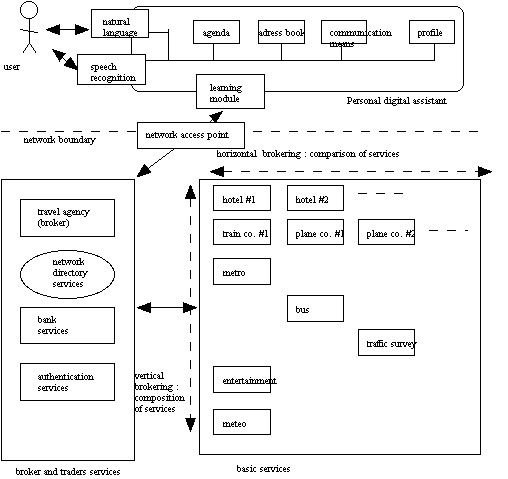FIPA
Proposal for application type
"Travel planning and management"
-CNET/CCETT application proposal-
We propose here an application for FIPA. This application is named " travel
planning and management ".
1. Scenario
The basic scénario is the following :
The user queries his " personal assistant " via natural
language (voice recognition and/or typed text:
" I must meet M. Kane from Rosebud company in New-York
the 29 of september in the afternoon. Plan me a trip for this appointement. "
The system (PDA plus network-based applications) is expected to take
the following actions :
- put the meeting in the agenda, and send a confirmation to M. Kane,
- recognize the fact that the user lives and works in Chicago, that the
meeting is in New-york, and therefore contact a travel agency to plan a
trip,
- book the trip via plane/train via the travel agency,
- use user profile to choose between means of transportation, company,
comfort level and price,
- book hotel if necessary (depending on time of arrival/departure), (also
use user profile to choose hotel)
- return within half a day a notification of the trip planned,
- insert travel-related time in the agenda, together with alarm-clock,
- notify of iintra-city transportation means to be used :
- -intra-city means can be : bus, metro, taxi, car-rental etc,
- -travel from home to airport/station (time necessary to),
- -travel means to be used in destination : airport-hotel, hotel
to appointement, appointment-entertainment.
- put a watchdog on train/plane schedules, warning for delayed/modified
svchedules via user preferred notification mean (pager, SMS-GSM, fax ...)
- survey traffic if car/taxi is to be used.
2. Application components

3. Benefits from agent technology
3.1. Features
The above exemple is mean to demonstrate the following agent capacities :
- differed mode for request : the user needs not to be connected
while the request is completed,
- vertical brokering : composition of services,
- horizontal brokering : comparison of services,
- auto-learning for user profile,
- speech-and text recognition,
- interoperability of communication means (phone, pager, email, cellular
phones/GSM),
- administration of agent agency: ability to track agents,
- alerts triggered by events and forwarde by agents to the user,
- financial transaction, via bank and authentication service (i.e. trusted
third-party)
- automatic indexation of services, as they are created, to be used by
brolkers and/or users,
- brokers are services, and can be used by other services. The schema
aboves distinguish between basic services (plane, meteo) and brokers services
(travel agency, bank). The distinction is artificial and introduced here
for the clarity of the schema.
3.2. Remark
Of course all the above items can be separately build with non-agent
technology. It is our conviction that the use of agent technology and inter-agent
communication protocols gives us the only mean for building large (i.e.
commercial) systems of services in a modular way.
The advantage of modularity is well-know : it allows "plug-in"
software, and painless extension of capabilities. For instance, if the PDA
is build on agent technology, an additional software component (natural
language interface ...) can be inserted and used without difficulty (just
like a web-browser plug-in).
3.3. Type of actions
We can classify the above described features into a set of properties.
| Property | Feature |
| combination of services |
horizontal and vertical brokering |
| constrained requests | user profiling |
| personalization | id. |
| time-constraints |
time-limit on request |
| speech reconigition | user interface |
| test recognition | id. |
| conditional action |
ex : "notify me if plane if delayed" |
| notification | id. |
| learning | automatic user profiling |
| security and confidentiality |
bank transaction |
| authentication | bank transaction, authentication of mobile agents,.. |
| research action | directory services (trading) |
Authors and Adresses
Alain Léger,:
CCETT dept AMS/ARM
4, rue du Clos Courtel, BP 59, 35512 CESSON-SÉVIGNÉ
cedex -- FRANCE
tel+33 99 12 42 23/ fax +33 99 12 40 98 (before october 18, 1996)
tel+33 (0)2 99 12 46223/ fax +33 (0)2 99 12 40 98 (after october
18, 1996)
Henry Thomas : CCETT dept AMS/ARM
4, rue du Clos Courtel, BP 59, 35512 CESSON-SÉVIGNÉ
cedex -- FRANCE
tel+33 99 12 46 23/ fax +33 99 12 40 98 (before october 18, 1996)
tel+33 (0)2 99 12 46 23/ fax +33 (0)2 99 12 40 98 (after october
18, 1996)
Thierry Bouron,
CNET/LAA Technopole ANTICIPA
Technopole Anticipa, 2 av. Pierre Marzin, 22307 LANNION -- FRANCE
tel +33 96 05 14 82 (before october 18, 1996)
tel +33 (0)2 96 05 14 82 (before october 18, 1996)
David Sadek,
CNET/LAA Technopole ANTICIPA
Technopole Anticipa, 2 av. Pierre Marzin, 22307 LANNION -- FRANCE
tel +33 96 05 14 82 (before october 18, 1996)
tel +33 (0)2 96 05 14 82 (before october 18, 1996)

